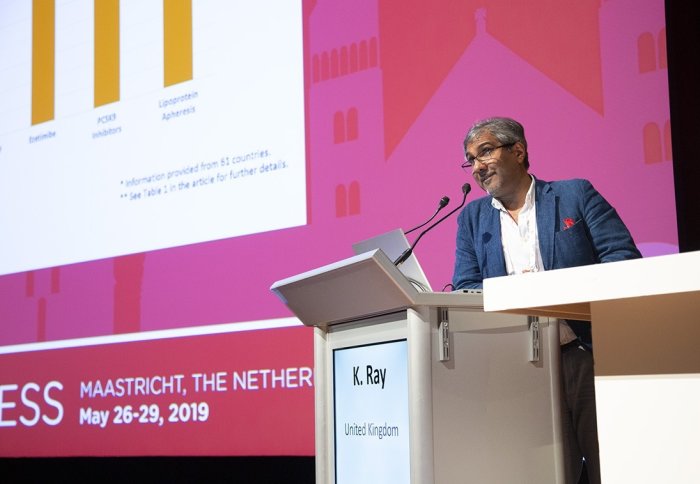Professor Ray elected President of the Atherosclerosis Society
by Jack Stewart

Professor Kosh Ray presenting at the European Atherosclerosis Society Conference
Professor Kosh Ray, Chair in Public Health, has been elected as the next President of the European Atherosclerosis Society (EAS).
He will take up the role of President-Elect from January 1, 2020, starting a four-year term as President from January 2021.
As Director of the Imperial Centre for Cardiovascular Disease Prevention and Deputy Director of the Imperial Clinical Trials Unit, Professor Ray’s research focuses on the prevention of cardiovascular disease with a special interest in lipids and diabetes. Much of his recent work has been on the early benefits of statin therapy and the risk and benefits of aspirin therapy. Kosh’s work on statins and diabetes had led to a global label change for statins by the FDA and EMEA.
Professor Ray, said: “It is a huge honour to be elected to President of the EAS. The society goes back over 50 years and is the largest society dedicated specifically to the study of a pathology that accounts for the largest burden of disease globally.
“At least in my time I have not known of a UK based President. At a time when there is uncertainty about the desire of the UK to look outwards, this is a statement that science transcends boundaries and borders bringing us together by what we have in common rather than differences.
The EAS was founded in 1964 with the aim of “advancing and exchanging knowledge concerning the causes, natural history, treatment and prevention of atherosclerotic disease”. Professor Ray will succeed Professor Lale Tokgözo?lu who has been President since 2017.
In his manifesto for his term as President, Professor Ray aims to embrace and enhance the diverse and broad membership base to grow the society and disseminate knowledge, best practice and opportunity to all.
“My hope and aspirations for the society are to help shape the research agenda for the next decade, bring together researchers and physicians beyond the borders of Europe and develop young people to continue the work as they will have to deal with the same issues in years to come.
“In addition to the core strengths of basic science, the EAS has developed population science and our broad membership globally should add health policy and implementation of best practice. New technologies and a new generation allows better opportunities for personalised medicine and we will see how the society can help.”
Article text (excluding photos or graphics) © Imperial College London.
Photos and graphics subject to third party copyright used with permission or © Imperial College London.
Reporter
Jack Stewart
School of Public Health